Queer/ing Game Space: Sexual Play in World of Warcraft
 Friday, May 30, 2014 at 2:44PM
Friday, May 30, 2014 at 2:44PM Nathan James A. Thompson
[ PDF Version ]
Encountering the Unusual
As I approached the small town of Goldshire, I was already aware that something was different. There were people everywhere: outside by the stable, sitting on the grass, fighting by the lake, and even jumping on the roof of the local blacksmith. The town and its buildings were usually empty, and I was expecting things to be the same tonight. Cautiously, I walked up to the front door of the local tavern, the Lion’s Pride Inn, and immediately could hear the loud muddled buzz of multiple conversations. I proceeded to walk in through the front entrance and, to my amazement, the tavern was so full of people that I couldn’t even see through the crowd to where the barkeep was located on the other side. Never before had I seen this many people together anywhere in Azeroth, let alone in one small tavern. After some eavesdropping and casual conversations with a few of the patrons I began to understand why the tavern was so busy: people were looking for sex and this was the place to do it.
World of Warcraft (WoW) is the world’s most populated Massively Multiplayer Online Role-playing Game (MMORPG). The game is built for personal questing, battling, and team-centered combat. It centers on the fictional world of Azeroth and players can choose to be an avatar in one of two warring factions, the Horde and the Alliance. As a player of the Alliance I often selected to play as a Human and today was no exception. It was, however, the first time I had stepped foot on a role-playing (RP) server. WoW has over 200 servers to select from and each server has one of three different designations. The two most common server designations are player versus player (PvP) and player versus environment (PvE) and their focus is on in-game combat and avatar leveling. RP servers are the least common and their focus is on role-playing between players and groups, while still offering the usual questing and combat.[1] I decided to create a character on a RP server because I was always fascinated by in-game role-play and envious of those who participated. I felt like I was “missing out” on a more intense and fulfilling gaming experience.
My first encounter with the busy tavern occurred as I entered the town of Goldshire on my new RP server named Moon Guard. Goldshire is located just south of the Human capital city of Stormwind, and every new Human avatar must find their way to Goldshire at the beginning of the game for a number of important quest lines. On all of the other servers I had played before, Goldshire was a ghost town and was never viewed with any particular interest by players of the game: it was mundane, low-key, and not worth anyone’s time. However, on this RP server the town and the tavern in particular were a focal point of sexual activity known in-game as erotic role-play (ERP). In fact, I would soon come to find that the players on this server often refer to Goldshire as “Pornshire” because of the sexual practices taking place.
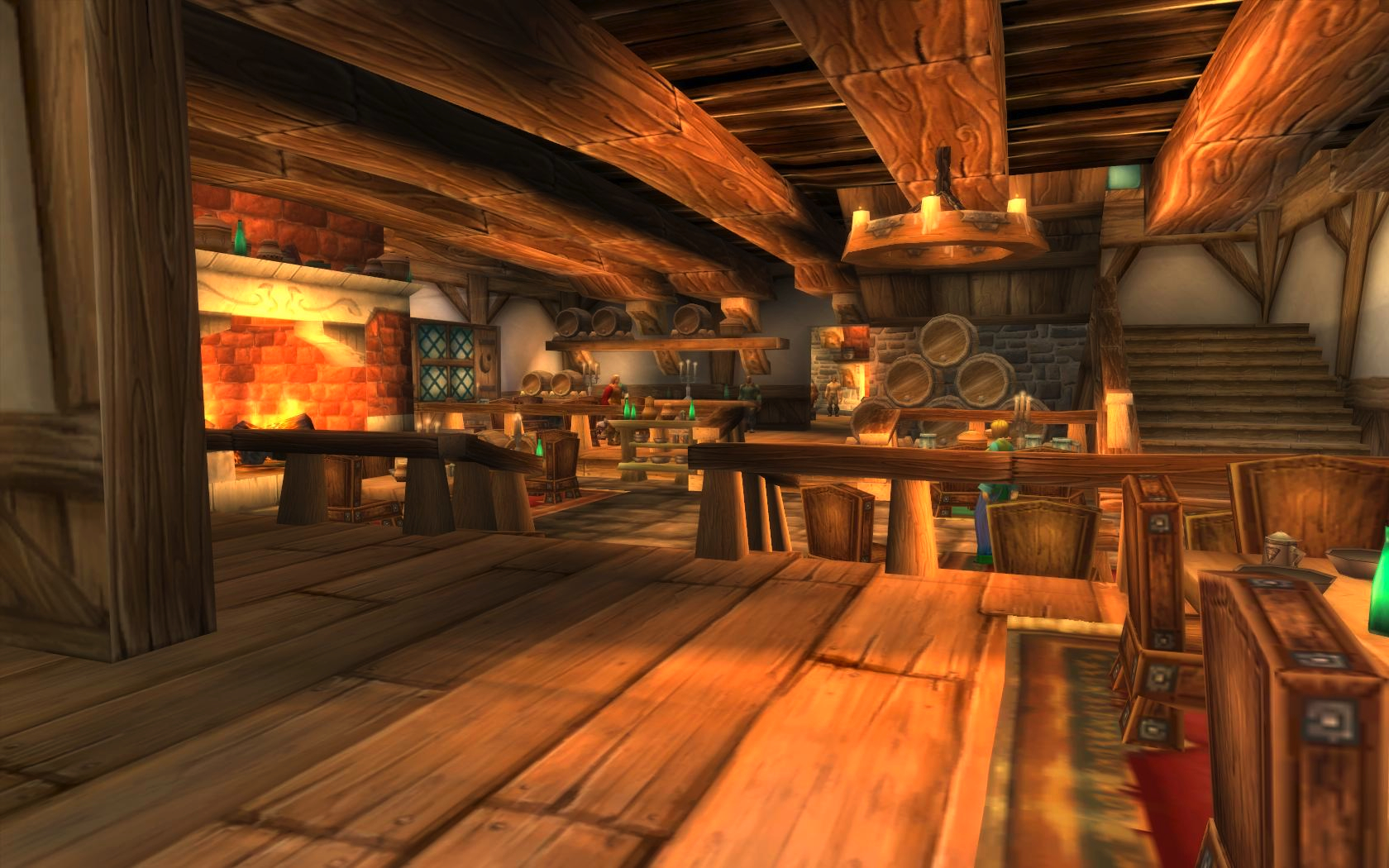
Above: Goldshire Interior.
Below: Pornshire Interior.
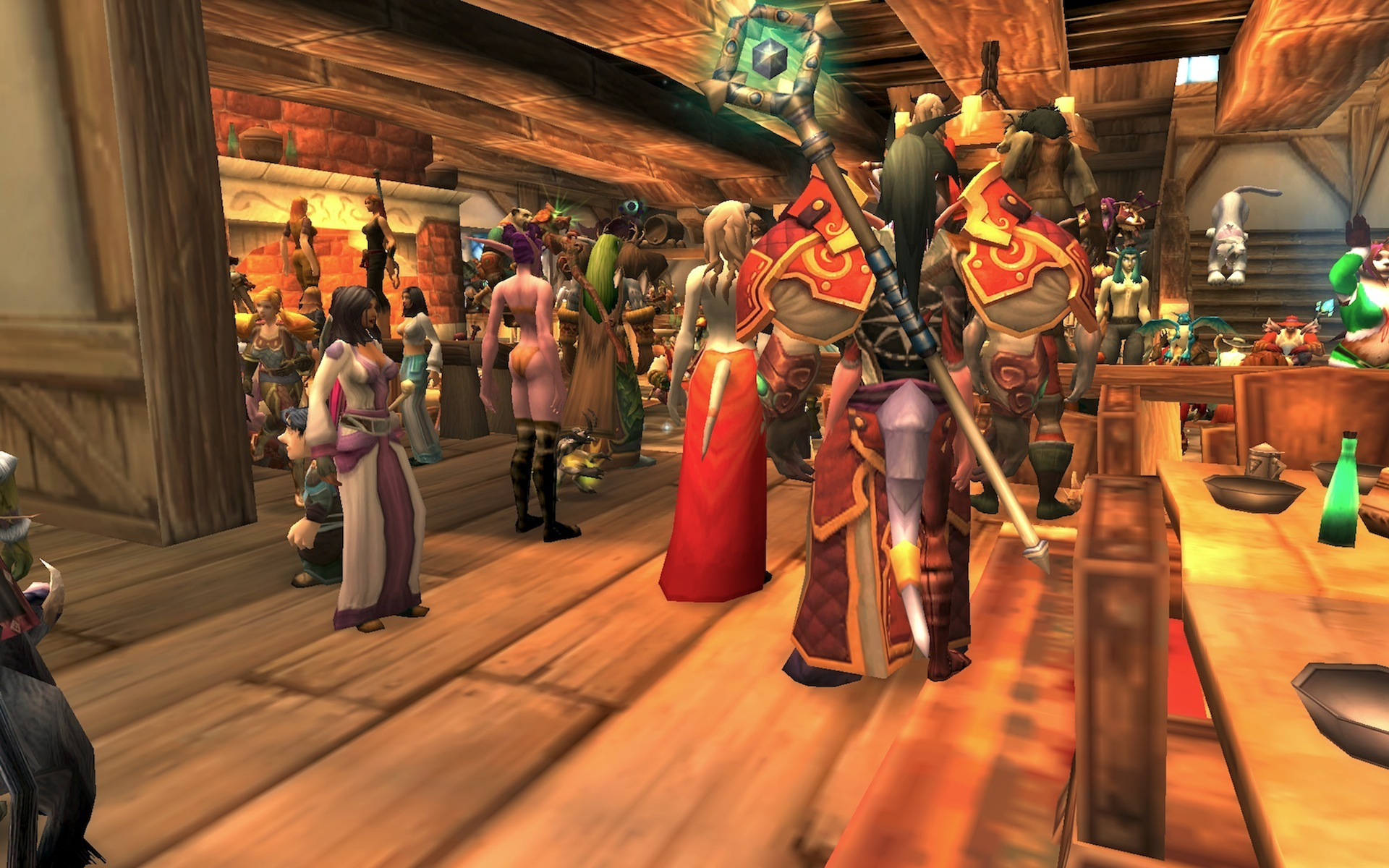
It was no surprise to learn that Blizzard Entertainment, the company that produces WoW, was unhappy with the ERP community on this RP server and that they had been receiving complaints from players about the inappropriateness of the sexual practices taking place.[2] In fact, Blizzard has tried on a number of occasions, but without much success, to monitor and police the sexual activity of the players. While Goldshire was programmed and designed to provide new Human players in WoW with a place to gain new quest lines and become familiar with WoW game-play, somehow players on this RP server managed to transform the atmosphere of the Lion’s Pride Inn to one akin to popular nightclubs found in the non-virtual world: dancing and “picking up” are regularly occurring practices.
Queer/ing Game Space
For the next seven months I spent a great deal of time in “Pornshire” talking with its inhabitants, recording public chat forums, and doing general participant observation. It was through this qualitative exploration that I came to realize that “Pornshire” was not exactly as it first seemed. While it was quickly apparent that the players who congregated in the tavern were seeking ERP, their out-of-game gender and sexual orientation were unknown. To the initial viewer, this sexual space would seem extremely heteronormative. That is, players are presented with hyperfeminine and hypermaculine virtual bodies engaging in heterosexual relations with each other. The only time you see same-sex sexual interactions is when two female avatars dance together for the benefit and attention of the male players. However, after chatting with and interviewing a number of players I quickly realized that my assumptions about this space were unfounded. In fact, I found that male identified individuals offline were embodying the majority of the female avatars (M2F) in “Pornshire,” and that they were engaging in heterosexual sexual play with male players embodying male avatars (M2M). The Lion’s Pride Inn housed sexual play that was crossing normative gender and sexual boundaries.
Most of the M2F players I interviewed identified as gay or bisexual whereas all of the M2M players I interviewed identified as straight. The M2M players, while often saying they “hoped” the female avatar was played by a “real” woman, also said they didn’t really care too much who was on the other end as long as they were good at sexual role play. The M2F players almost always asserted that they were not transgender and not interested in being a woman offline even though they said they enjoyed pretending to be a woman to sexually please the M2M players. So there was palpable “unusualness” to the gender and sexual play taking place in “Pornshire.” The sexual practices could not easily be placed into any normative category of gender or sexual identity. Were the M2F players transgender even though they said they were not? Were the M2M players gay offline but just playing straight online? Or, perhaps, were the practices and pleasures occurring in “Pornshire” challenging traditional ideas around what it means to be a “man,” “straight,” and/or “gay,” as they trouble essentialist notions of gender and sexual orientation?
Previous work that looks at gender bending and gender/sexual play within virtual worlds further complicates the community of “Pornshire.” In her study of gender bending in online games (including WoW), Esther MacCallum-Stewart found that men often play female avatars not to explore their own gender identification but because they enjoy looking at the hypersexual female avatar body.[3] Online gaming forums seem to confirm her conclusion as male players often confess to playing female avatars simply because it gives them “an ass to stare at.”[4] However, the M2F players in “Pornshire” are not merely bending their gender, they are engaging in sexual play. According to Al Cooper, David Delmonico, and Ron Burg, the belief that men often gender-bend in order to engage in cybsersex with other men is unfounded and the practice is quite uncommon.[5] Dennis Waskul and Justin Martin found in their examination of Second Life sexual communities that most players did not switch their gender and sexual identities.[6] So it seems that the “Pornshire” community represents a bit of an enigma. The M2F players are not gender swapping for “an ass to stare at,” but are doing so to engage in sexual play, a kind of “play” previous research has shown is quite uncommon.
It is the transformation of Goldshire into “Pornshire” via the sexual and gender play at work there that I refer to as a “queering” of game space. For the purpose of this paper, “queering” refers both to sexual identity (as Queer players were identified as being a large part of the community) and a process of de-normalizing or “making strange” (using “queer” as a verb – to “queer”).[7] Kath Browne defines the queering of space as, “The possibilities of moving beyond limited and normal male/female, hetero/homo divides,” and that it entails a “radical (re)thinking, (re)drawing, (re)conceptualization, and (re)mapping that could (re)make bodies, spaces, and geographies.”[8] I assert that the ERP community in Warcraft moves beyond the normal binaries of sex, gender, and sexual identity and that the participants have “made strange” the gaming space of Goldshire into that of “Pornshire.”
The “queering” of game space is made even more apparent when you look at some of the more marginal sexual practices taking place in the community that go beyond the mere M2F/M2M interactions. The Warcraft universe has a rich history filled with two decades worth of Tolkien-style lore. Part of this lore is the inclusion of a variety of species (known in-game as “races”[9]) such as Dwarves, Elves, and Orcs. While the majority of the avatars in “Pornshire” are Human, a good number are also Night Elf, Draenei, Worgen, and the newest WoW race, Panderan. These non-human species add an interesting dynamic to the ERP taking place, as their virtual bodies are not human-normative and have unique characteristics that modify sexual play into something most would consider a fetish. For instance, the Worgen are werewolf-like in appearance. Worgen are often used in sexual play as aggressive animal-like sexual predators. Players said they enjoyed ERP with the Worgen because it let them live out a fantasy that would otherwise be impossible and/or shunned offline because of both the invoking of sexual aggression and, perhaps more obviously, the fact that they were having sex with a half-human, half-animal. The Draenei are used in a similar way as they appear to be half-alien, half-goat-like humanoids and players often talked about the uniqueness of having sex with them because they have both horns and a tail. Sexual play involving the above races makes the town of “Pornshire” even stranger, as the practices taking place cross human-human sexual interaction boundaries. No longer are we just taking into account the mixed gender/sexual orientation of the players in relation to the Human avatars they are embodying, now we are looking at sexual play that troubles the so-called stability of gender, sexuality, and species.
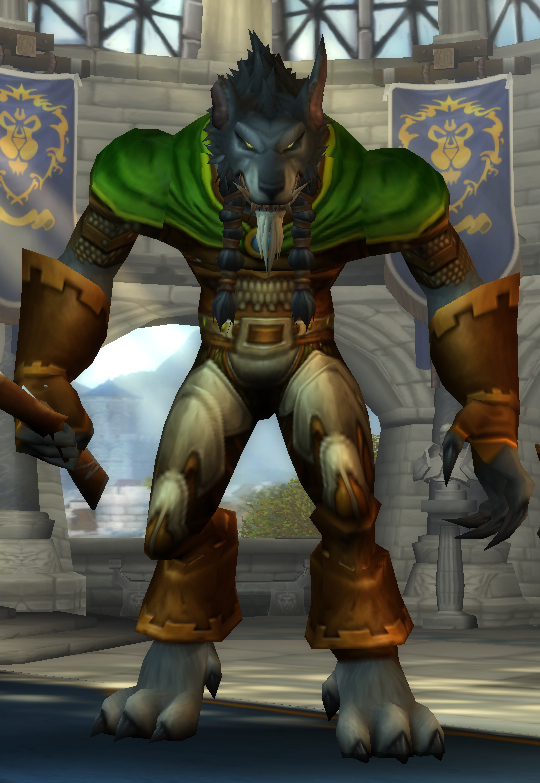
Worgen Character Class
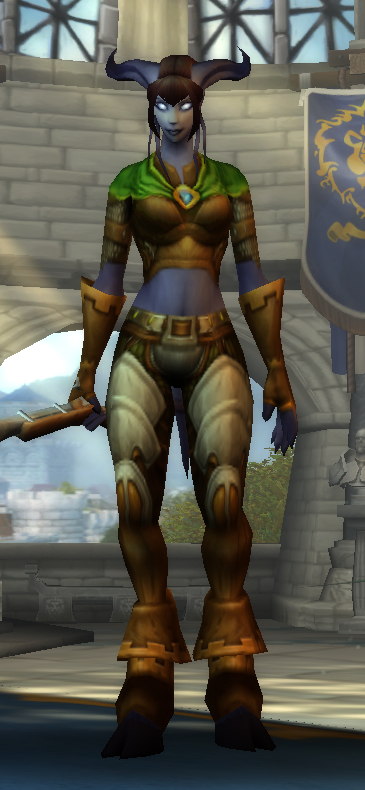
Draenei Character Class
Other WoW gamers confirm my assertion that Goldshire on the Moon Guard server has been “made strange,” as it is often referred to as an oddity. A simple Google search reveals that the sexual play taking place on this particular server is well documented by WoW gamers on gaming chat forums, and the practices are almost always referred to as weird, perverted, strange, disgusting, and a place for “freaks” to congregate. New players on the server are often told by veterans to avoid “Pornshire” at all cost. The ERP participants render the gaming space unusual and their fellow gamers have taken notice. Unsurprisingly, because the town is talked about as an oddity and has become well known for its sexual play on Internet gaming forums, WoW players from different servers will log on to Moon Guard in order to witness “Pornshire” first hand. Furthermore, Blizzard recently introduced “cross-realm zones” in which certain zones in the game are populated by players from multiple servers at the same time in lower populated areas of the game. As a result of this move, players on other RP realms are merged with those from Moon Guard, thus increasing the number of players traveling to “Pornshire” regardless of their awareness of the sexual play taking place.
So why does “Pornshire” matter? The players engaging in sexual play are troubling what Judith Butler calls the “heterosexual matrix.” That is, the linking of discourses of masculinity and femininity to biologically based sex which leads to the naturalizing assumption that in order to find love and sex, one must seek out someone of the opposite sex and gender. Butler argues that the troubling of the heterosexual matrix matters because it offers the possibility of transgression, resulting in greater discursive space for the existence of non-normative gender and sexual performances.[10] Could the mere existence of Pornshire result in greater acceptance of queer sexual and gender practices via transgressive play? Would this acceptance translate to the non-virtual world? Or does the “making strange” of the game space only contribute to the marginalization of non-normative forms of sexual and gender play, positioning people who engage in such play as “outsiders” who are “perverting” the game? Either way, the sexual play community in WoW matters since it provides us with a tiny slice of how gamers are using game spaces in unorthodox ways and how gaming spaces can provide gamers with an outlet for both sexual exploration and pleasure that may otherwise be impossible.
Queer Space ≠ Anti-oppressive Space
My assertion that “Pornshire” queers the gaming space of Warcarft is not to suggest it offers an equitable space to participate in gender and sexual play. Natalie Oswin reminds us that studies exploring queer space “have not generally been coupled with recognition that queer space […] is implicitly white space.”[11] Lisa Nakamura in her work on marginalized populations in gaming communities has found that in-game racism is a common occurrence and asserts itself not just through language but also gaming practices.[12] Tanner Higgin writes about the lack of blackness within WoW both via the small number of Black avatars in-game, but also the absence of Black characters in Warcraft lore.[13] In her study on gaming practices in the MMO Lineage, Constance Steinkuehler found that Chinese gamers played female dwarf characters for the purpose of farming in-game currency to sell to American players. American players, unhappy with the practice of in-game currency farming, harassed and killed female dwarf characters while also yelling racist and anti-Chinese epithets.[14] On many of my visits to “Pornshire,” I witnessed racism both through the language of the participants in the community and in the sheer absence of Black human avatars. It was not uncommon to hear the “n-word”[15] uttered by players in general chat or out loud in the tavern.[16] On a number of occasions, I overheard players joke about Black celebrities and the Black community in general. At times they even referred to violent acts such as whippings and lynchings. In fact, on one of my visits to “Pornshire,” a player had the name “Nigakiler,” and on another visit I saw a player with a pet gorilla named “BarackObama.”[17]
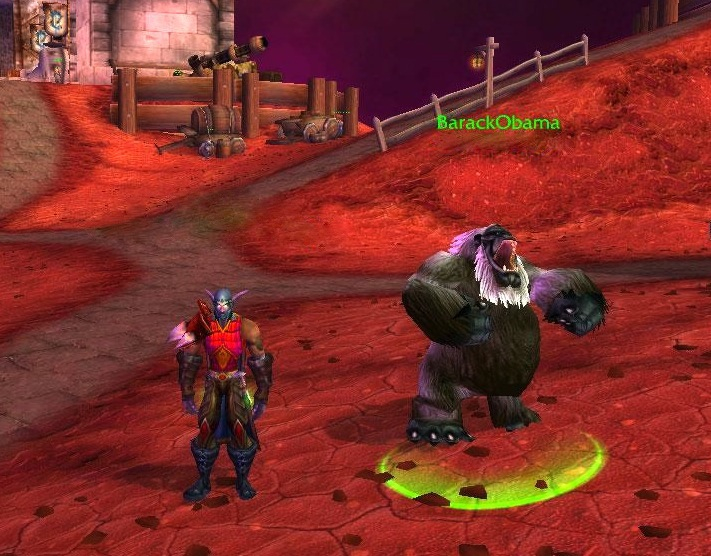
Evidence of racism in Pornshire.
The queer sexual space of “Pornshire” is also one of racialized otherness, where racism is an implicit part of the space and where non-white Human avatar bodies and non-white players are made to feel unwelcome and unviable as members of the ERP community because of the exclusionary practices taking place. So while I argue that the sexual practices of the “Pornshire” residents queer the game space and normative categories of sexual and gender identity, they do not call into question the normative whiteness found within the larger WoW and/or gaming community. In fact, during my time in-game as a researcher I found that the amount of racism in “Pornshire” was much more noticeable than that found elsewhere in WoW.
Conclusion
“Pornshire” represents an oddity in the WoW universe. Gamers have managed to forge a sexual play space even though the game was not constructed for sexual play. The game developer has condemned the ERP community and threatened to shut it down on a number of occasions over the past few years. Despite the general unhappiness with the existence of the “Pornshire” community, it continues to grow and thrive. I have argued that the “Pornshire” community is queering the gaming space of WoW. Not only has the town become an in-game destination for sexual tourists, but the participants of the sexual play often trouble the normative boundaries of gender, sexual orientation, and the body. The queering of game space as seen in “Pornshire” provides an opportunity for gamers to experiment with their own sexual and gender embodiment and desires. In fact, more and more narratives are appearing online that discuss the productiveness and worthwhileness of gaming spaces in the exploration of sexual and gender issues. Some players have even stated that the game helped them to come out as transgender.[18] However, while the queering of Goldshire results in sexual play possibilities that are more difficult offline, it upholds and promotes an atmosphere of white privilege, thus constructing non-white ERP participants as unwanted.
My exploration of the “Pornshire” ERP community opens up important questions for media studies scholars interested in sexuality, gender, and race. How and why do gamers reconfigure game space for sexual play? How is sexuality and sexual play modified by the gaming environment and vice versa? How does the use of game space for sex intersect with issues of race, gender, class, and ability? While research on marginalized populations within gaming communities has been on the rise, there has still been very little work that looks at queer players and queer sexual practices. My work focused on the town of “Pornshire” due to its large congregation of ERP participants, but sexual play happens elsewhere in the game, albeit in more hidden and inconspicuous ways. Sexual play also happens in other MMORPGs, as is revealed by the volume of conversations about ERP on a variety of gaming websites and community forums. In light of the above, it is important to remember that gaming spaces and gaming communities are also and importantly spaces and communities of sex and sexuality.
Notes
[1] The kind of role-playing I’m referring to here is player directed role-play with other players that goes beyond the regular game parameters of combat and questing.
[2] Matthew McCurley, “Blizzard to patrol Moon Guard’s Goldshire for harassment, erotic role playing,” WoW Insider, August 2010, wow.joystiq.com/2010/08/04/blizzard-to-patrol-moon-guards-goldshire-for-harassment-erotic
[3] Esther MacCallum-Stewart, “Real Boys Carry Girly Epics: Normalizing Gender Bending in Online Games,” Eludamos: Journal for Computer Game Culture 2, no. 1 (2008): 27-40.
[4] “Advantages/disadvantages Being Female Avatar,” World of Warcraft Official Forums. us.battle.net/wow/en/forum/topic/3566297403 (originally posted on 9 November 2011).
[5] Al Cooper, David Delmonico, and Ron Burg, “Cybersex Users, Abusers, and Compulsives: New Findings and Implications,” Sexual Addiction & Compulsivity 7, no. 1-2 (2000): 5-29.
[6] Dennis Waskul and Justin Martin, “Now the Orgy is Over,” Symbolic Interactionism 33, no. 2 (2010): 297-318.
[7] Throughout the paper I use Queer (uppercase “Q”) as an umbrella term for non-heterosexual people and queer (lowercase “q”) as a verb.
[8] Kath Browne, “Challenging Queer Geographies”, Antipode, no. 38 (2006): 885-893.
[9] The use of the term “race” by Blizzard and other MMORPG production companies to denote different humanoid species needs to be interrogated, especially in light of the observed hegemonic whiteness in-game and in Warcarft lore. However, such an analysis is not within the scope of this paper.
[10] Judith Butler, Gender Trouble (New York: Routledge, 1990).
[11] Natalie Oswin, “Critical Geographies and the Uses of Sexuality: Deconstructing Queer Space,” Progress in Human Geography 32, no. 1 (2008): 89-103.
[12] Lisa Nakamura, “Race and Identity in Digital Media,” in Mass Media and Society, 5th edition, ed. James Curran (New York: Bloomsbury Academic, 2010), 336-347.
[13] Tanner Higgin, “Blackless Fantasy: The Disappearance of Race in Massively Multiplayer Online Role-Playing Games,” Games and Culture 4, no. 1 (2009): 3-26.
[14] Constance Steinkuehler, “The Mangle of Play,” Games and Culture 1, no. 3 (2006): 199-213.
[15] The players in the game used the actual word. I chose to not replicate the verbatim use of the n-word in my paper, as the word carries a deeply oppressive history.
[16] Players have a number of different ways to communicate. The general chat forum is where people can communicate within a general area but without having to be physically near the other chat participants. Players can also “say” things out loud and only those who happen to be near the individual when they are said can see this text.
[17] The photo used here was found on an on-line forum and posted by an anonymous user. While the location the photo was taken was not “Pornshire” it appears to be the same gorilla that I came across during my time there.
[18] Laura Kate Dale, “How World of Warcraft Helped Me Come Out as Transgender,” The Guardian Games Blog, January 2014, www.theguardian.com/technology/ gamesblog/2014/jan/23/how-world-of-warcraft-game-helped-me-come-out-transgender
Nathan James A. Thompson is a PhD student in Sociology at the University of New Brunswick in Fredericton, NB, Canada. His dissertation research uses ethnographic methods to explore the emergence of LGBTQ gaming guilds and communities.